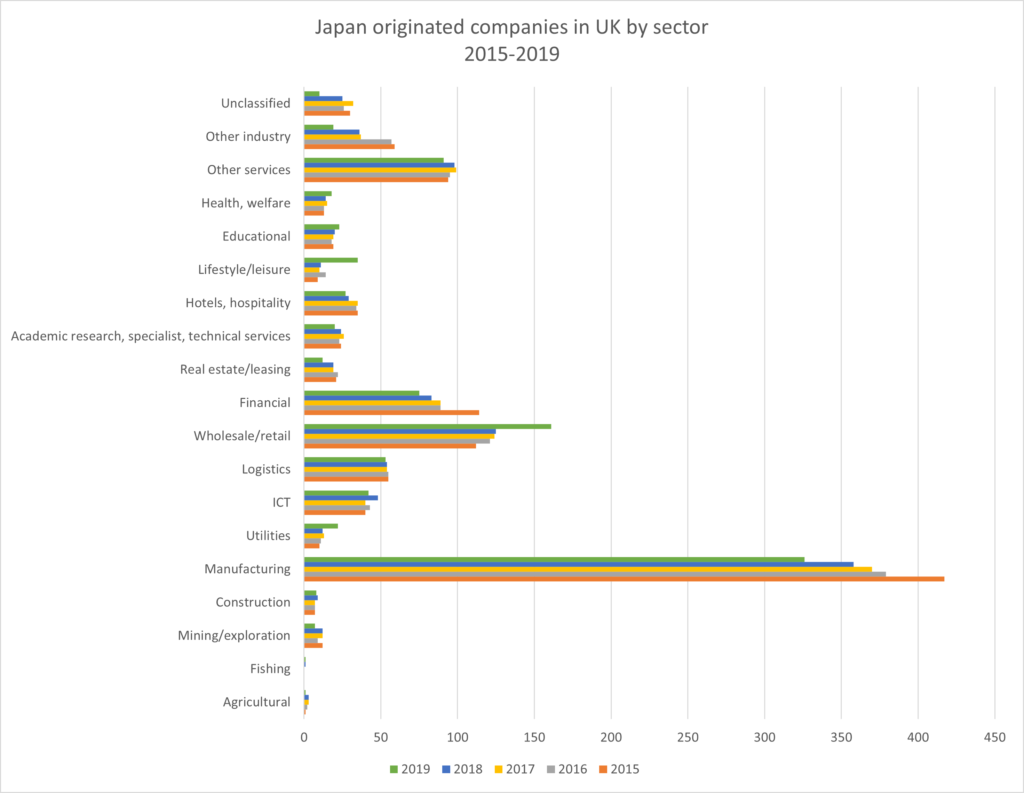Top 30 Japanese employers in Europe, Middle East, Africa 2021
The major Japanese employers in Europe, Middle East and Africa employ over 540,000 people, a 1.4%* rise comparing financial year 2018/9 to 2019/20, even though their global employee numbers have shrunk by around 1% over the same period. As in previous years, acquisitions of companies in the region are the main growth drivers.
The top 5 largest employers remain the same – Sumitomo Electric Industries, Yazaki, NTT Data, Fujitsu and Canon. The rest of the top 10 are the same, apart from Hitachi rising from 14 to 9, bumping Toyota Tsusho to number 11.
Exiting the Top 30 are Mitsubishi Corporation, Mitsubishi Electric and Olympus – not so much due to any decline as the growth of the new entrants LIXIL (following its acquisition of Grohe), NEC (acquiring KMD in Denmark and Northgate in UK) and Asahi (having acquired various European beer brands such as Peroni, Fullers and Grolsch).
Which company to work for
We have previously recommended that people wanting to work for a Japanese company should consider not just whether it is growing in the region but also what proportion of its employees are in the region. The greater the proportion, the more influence the region is likely to have in headquarters’ decisions.
The average for proportion of employees in the EMEA region of the top 30 is around 14%. Those with more than a quarter of their global employees in EMEA are NSG (due to its acquisition of Pilkington), Asahi Group (due to the acquisition of the beer brands mentioned above), Asahi Glass (the continuing influence of the 1981 Glaverbel acquisition), Sumitomo Electric Industries (the continuing influence of acquiring Volkswagen Bordnetze in 2006), Toyota Tsusho (acquired French company – mainly operating in Africa – CFAO in 2012).
The companies who score highly both in terms of growth and proportion of employees in the region are Sumitomo Electric Industries, Toyota Tsusho and NTT Data. The latter grew through acquisitions of Dimension Data, Keane and Itelligence but appears to have shrunk its EMEA employees over the 2018/9 to 2019/20 period. This is actually due to Latin America being excluded from the regional total in 2019/20, having been previously included. Dentsu also has nearly a quarter of its employees in EMEA and has grown nearly 50% since 2014/5 due to the acquisition of Aegis Network and subsequent smaller acquisitions, but the numbers are starting to decline as it starts to consolidate and restructure, aiming to cut its overseas roles by 12.5%.
Dentsu does not publish consolidated regional employee numbers, and neither do trading companies such as Mitsubishi Corporation, Toyota Tsusho and Itochu. Some have been inconsistent in publishing details – JT International for example – so we have had to use our best guesses and our own database. Overall the level of transparency in Japanese companies’ reporting on overseas employees has improved tremendously over the six years we have been tracking them, thanks to Japanese companies’ enthusiastic adoption of UN Sustainable Development Goals. Perhaps a lack of transparency on employee details should be a factor to consider in terms of desirability as an employer.
If you’re thinking of working for a Japanese company, a good way to signal that you know what you’re letting yourself in for would be to obtain the certificates from doing the e-learning modules on working in a Japanese company from the leading global Japan focused intercultural training company, Japan Intercultural Consulting.
*If NTT Data is excluded, as the 2018/9 employee numbers for the EMEA region in their annual report included Latin America, but Latin America was not included in the 2019/20 regional employee numbers. Including NTT Data in 2019/20 figures produces a small decline in the regional employee total for the Top 30 of -0.24%.
FREE PDF DOWNLOAD OF TOP 30 JAPANESE EMPLOYERS IN EMEA
For more content like this, subscribe to the free Rudlin Consulting Newsletter. 最新の在欧日系企業の状況については無料の月刊Rudlin Consulting ニューズレターにご登録ください。
Read More
